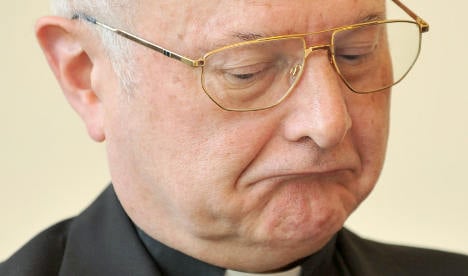Robert Zollitsch, the head of German Bishops’ Conference, is being investigated
for allegedly turning a blind eye to the abuse by a priest, public prosecutor Wolfgang Maier in the southern city of Freiburg said.
The Freiburg diocese said Zollitsch strongly denied the charges.
ARD public television reported earlier that the alleged victim said he was abused at the Birnau Monastery in the Freiburg diocese, where Zollitsch was employed.
Prosecutors said the man accused Zollitsch, who was responsible for human resources in the diocese, of learning of the abuse but nevertheless assuring that the priest was employed again at Birnau in 1987.
Maier told news agency AFP the case had been passed on to the state prosecutor’s office in Konstanz, southern Germany “without further review” because an investigation of the priest was already underway there.
“That is why I cannot comment on the substance of the accusations,” he said.
A spokesman for the Konstanz prosecutor’s office said Wednesday that the files had not yet arrived.
A Freiburg diocese spokesman said that Zollitsch had not ordered the priest to be employed at Birnau, saying the monastery operated “independently.”
“The accusations of criminal behaviour by Dr Robert Zollitsch in connection with the Birnau Monastery are without foundation,” he said.
“The former human relations chief Zollitsch was neither aware of the accusations from the 1960s nor of a new hiring of this priest and in no way ordered such a decision.”
The diocese said it had only become aware in late 2006 of at least one suspected case of sexual abuse at Birnau in the 1960s.
Like other European countries, Germany has been rocked in recent months by revelations that hundreds of children were physically or sexually abused in institutions, the vast majority run by the Roman Catholic Church.
The scandal has badly damaged the standing of the Church in Germany, and also of the German-born pope, five years after his appointment as leader of the world’s 1.1 billion Catholics was a source of great national pride.
Zollitsch, 71, had met with Pope Benedict XVI in April at the Vatican about the spreading scandal.




 Please whitelist us to continue reading.
Please whitelist us to continue reading.
Member comments